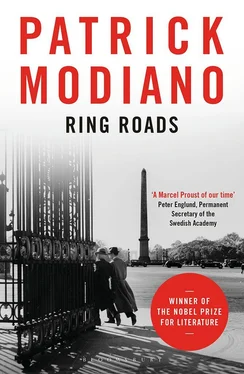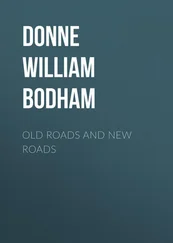Patrick Modiano - Ring Roads
Здесь есть возможность читать онлайн «Patrick Modiano - Ring Roads» весь текст электронной книги совершенно бесплатно (целиком полную версию без сокращений). В некоторых случаях можно слушать аудио, скачать через торрент в формате fb2 и присутствует краткое содержание. Год выпуска: 2015, Издательство: Bloomsbury Paperbacks, Жанр: Современная проза, на английском языке. Описание произведения, (предисловие) а так же отзывы посетителей доступны на портале библиотеки ЛибКат.
- Название:Ring Roads
- Автор:
- Издательство:Bloomsbury Paperbacks
- Жанр:
- Год:2015
- ISBN:нет данных
- Рейтинг книги:3 / 5. Голосов: 1
-
Избранное:Добавить в избранное
- Отзывы:
-
Ваша оценка:
- 60
- 1
- 2
- 3
- 4
- 5
Ring Roads: краткое содержание, описание и аннотация
Предлагаем к чтению аннотацию, описание, краткое содержание или предисловие (зависит от того, что написал сам автор книги «Ring Roads»). Если вы не нашли необходимую информацию о книге — напишите в комментариях, мы постараемся отыскать её.
The Night Watch
Ring Roads — читать онлайн бесплатно полную книгу (весь текст) целиком
Ниже представлен текст книги, разбитый по страницам. Система сохранения места последней прочитанной страницы, позволяет с удобством читать онлайн бесплатно книгу «Ring Roads», без необходимости каждый раз заново искать на чём Вы остановились. Поставьте закладку, и сможете в любой момент перейти на страницу, на которой закончили чтение.
Интервал:
Закладка:
Patrick Modiano
Ring Roads
RING ROADS
for Rudy
for Dominique
‘If only I had a past at some other point in
French history!
But no, nothing.’
RimbaudThe heaviest of the three is my father, though he was so thin back then. Murraille is leaning towards him as if whispering something. Marcheret stands in the background with a half-smile, puffing out his chest a little, his hands gripping the lapels of his jacket. It’s difficult to tell the colour of their clothes or their hair. It looks as though Marcheret is wearing a very loosely cut Prince-of-Wales check suit, and has fairish hair. Note the sharp expression on Murraille’s face, and the worried one on my father’s. Murraille seems tall and thin, but the lower half of his face is pudgy. Everything about my father expresses total dejection. Except his eyes, almost starting out of his head.
Wood panelling, a brick fireplace: the Clos-Foucré bar. Murraille has a glass in his hand. As has my father. Notice the cigarette drooping from Murraille’s lips. My father has his wedged between his ring and little fingers. A jaded affectation. At the back of the room, in semi-profile, a female figure: Maud Gallas, the manageress of Le Clos-Foucré. The armchairs in which Murraille and my father are sitting are probably leather. There’s a slight sheen on the back, just above the spot which Murraille’s left hand is stubbing into. His arm curls around my father’s neck in a gesture which could be hugely protective. Flagrant on his wrist is an expensive watch with a square face. Marcheret, given his position and athletic build, is half hiding Maud Gallas and the shelves of aperitif bottles. On the wall, behind the bar, you can see — without too much difficulty — a tear-off calendar. The number 14, clearly visible. It isn’t possible to make out the month or year. But, looking closely at the three men, and at the blurred outline of Maud Gallas, the casual observer would imagine the scene to be taking place in the distant past.
An old photograph, found by chance at the bottom of a drawer, from which you carefully wipe the dust. Night is drawing in. The ghosts file in as usual to the Clos-Foucré. Marcheret has perched on a stool. The other two have chosen armchairs by the fireplace. They ordered sickly and pointlessly elaborate cocktails which Maud Gallas mixed, with the help of Marcheret, who plied her with doubtful jokes, calling her ‘my great big Maud’ or ‘my Tonkinese’. She didn’t appear to take offence and when Marcheret slipped a hand into her blouse to paw a breast — a gesture which always causes him to make a sort of whinnying noise — she remained impassive, one cannot help wonder whether her smile reflects contempt or complicity. She’s a woman of about forty, blonde and heavily built, with a deep voice. The brightness of her eyes — are they midnight blue or violet? — is surprising in such a coarse face. What did Maud Gallas do before taking over this auberge ? The same sort of thing probably, but in Paris. She and Marcheret often refer to the Beaulieu, a nightclub in the Quartier des Ternes, that closed twenty years ago. They speak of it in hushed tones. Hostess? Ex-cabaret artiste? Marcheret has obviously known her a long time. She calls him Guy. While they are mixing the drinks and shaking with suppressed laughter, Grève, the maître d’hôtel, comes in and asks Marcheret: ‘What would Monsieur le Comte like to eat later?’ To which Marcheret invariably replies: ‘Monsieur le Comte will eat shit’, jutting his chin, crinkling his eyes and contorting his face in an expression of bored self-satisfaction. At such moments, my father always gives a little laugh to show Marcheret that he’s enjoyed this witty banter exchange and thinks Marcheret’s the funniest man he’s ever met. The latter, delighted at the effect he’s having on my father, asks him: ‘Isn’t that right, Chalva?’ And my father, hurriedly: ‘Oh yes, Guy!’ Murraille remains aloof from this repartee. One evening when Marcheret, in better form than usual, hiked up Maud Gallas’s skirt and said: ‘Ah, a bit of thigh!’ Murraille put on a shrill society voice: ‘You must excuse him, my dear, he thinks he’s still in the Legion.’ (This remark casts a new light on Marcheret.) Murraille himself affects the manners of a gentleman. He expresses himself in carefully chosen phrases and modulates his voice to make it as smooth as possible, adopting a kind of parliamentary eloquence. His words are accompanied by sweeping gestures, never failing to add some flourish of chin or eyebrow, and tends to flick his fingers as though opening a fan. He dresses elegantly: English tweeds, shirts and ties in subtle matching shades. So why the strong smell of Chypre which hangs around him? And the platinum signet-ring? Look at him again: his forehead is broad, his pale eyes express a joyful frankness. But, below that, the drooping cigarette emphasises the slackness of his lips. The craggy architecture of his face disintegrates at jaw level. His chin slides away. Listen to him: sometimes his voice grows harsh and cracks. In fact, one has a nasty suspicion that he’s cut from exactly the same coarse cloth as Marcheret.
This impression is confirmed if you watch the two men after dinner. They’re sitting side by side, facing my father — only the back of his head is visible. Marcheret is talking very loudly in a whip-like voice. Blood rushes to his face. Murraille has also raised his voice and his shrill cackling drowns Marcheret’s more guttural laugh. They wink conspiratorially and slap each other on the back. A sort of complicity is established between them, one you can’t quite pin down. You would have to be at their table, listen to every word. From a distance you can only hear confused — and meaningless — snatches of conversation. Now they’re whispering together and their words are lost in the great empty dining-room. From the bronze ceiling fixture, a harsh light spills down on the tables, the panelling, the Normandy dresser, on the stag and roebuck heads on the wall. It weighs on them like cotton wool, muffling the sound of their voices. Not a single patch of shadow. Except my father’s back. Strange how the light spares him. But the nape of his neck is clearly visible in the glare of the ceiling-light, you can even see a small pink scar in the middle. His neck is bent forward as though offered to an invisible executioner. He’s drinking in their every word. He moves his head to within an inch of theirs. His forehead almost glued to those of Murraille and Marcheret. Whenever my father’s face looms too close to his own, Marcheret pinches his cheek between his finger and thumb and twists it slowly. My father jerks back but Marcheret doesn’t let go. He holds him like that for several minutes and the pressure of his fingers increases. He knows my father must be in considerable pain. When it’s over, there’s a red mark on his cheek. He strokes it furtively. Marcheret says: ‘That’ll teach you to be nosy, Chalva. .’ And my father: ‘Oh yes, Guy. . That’s true, Guy. .’ He smiles.
Grève brings the liqueurs. His bearing and his ceremonious manner are in sharp contrast to the free-and-easy behaviour of the three men and the woman. Murraille, chin propped in his hand, eyes bleary, gives the impression of being more than relaxed. Marcheret has loosened his tie and is leaning his entire weight against the back of his chair, so that it’s balanced on two legs. Any moment now, it’s going to tip over. And my father is leaning towards them so intently that his chest is almost pressed against the table; a pat on the back and he’d be sprawled across his plate. The few words one can still catch are those grunted by Marcheret, thickly. A few moments later the only sound to be heard is his stomach gurgling. Is it the excessive meal (they always order dishes with rich sauces and various kinds of game) or the bad choice of wine (Marcheret always insists on heavy pre-war burgundies) which has stupefied them? Grève stands stiffly behind them. He asks Marcheret pointedly: ‘Would Monsieur le Comte like anything else to drink?’ stressing each syllable of ‘Monsieur le Comte’. He says even more heavily: ‘Thank you, Monsieur le Comte.’ Is he trying to call Marcheret to order, and remind him that a gentleman shouldn’t let himself go like that?
Читать дальшеИнтервал:
Закладка:
Похожие книги на «Ring Roads»
Представляем Вашему вниманию похожие книги на «Ring Roads» списком для выбора. Мы отобрали схожую по названию и смыслу литературу в надежде предоставить читателям больше вариантов отыскать новые, интересные, ещё непрочитанные произведения.
Обсуждение, отзывы о книге «Ring Roads» и просто собственные мнения читателей. Оставьте ваши комментарии, напишите, что Вы думаете о произведении, его смысле или главных героях. Укажите что конкретно понравилось, а что нет, и почему Вы так считаете.












